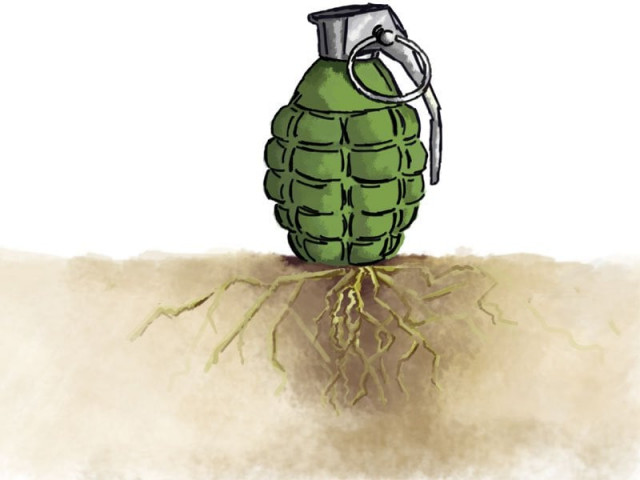Farmers in North Waziristan see a bleak 2013
Fertiliser has been banned to prevent usage in explosive devices.

Farmers in the agency suffered severe losses due to the restriction on urea and had a decline in the yield of all crops, says official. DESIGN: ANUSHAY FURQAN
As the ban on urea continues in North Waziristan, farmers fear that wheat production will substantially decrease this year.
Fertliser suppliers and farmers held a demonstration against the ban outside Miranshah Press Club, claiming the ban on nitrogen-based fertilisers is a violation of farmers’ rights. The fertiliser has been banned in the area to prevent its usage in making explosive devices.
Malik Sultan Khan, a local supplier of fertiliser from Mir Ali tehsil, said after the ban on urea, ammonia nitrate and phosphate, various crop yields had reduced to almost half. “Land which produced 20 sacks of wheat now only yields 12 sacks,” he added.
According to Khan, tribesmen from Mir Ali and other parts of the agency have asked political administration officials to allow the use of synthetic fertilisers – based on the assumption that it would improve production on arable lands. “We were told fertilisers are used in making bombs, but every tribesman cannot make explosives.”

Farmer Abdul Sattar succeeded a few times in procuring three or four sacks of fertiliser for his land in Mir Ali, but it cost him twice the original price as it had to be “cleared” at every check post. “It’s not like incidents of bombing have reduced in the agency following the ban.”
“Those who have to make bombs will make them by using even mud and sand,” said Sattar, adding the ban had not helped ensure peace. It’s only deprived farmers from high crop yields, he said, adding that natural fertiliser made from plant and animal waste is barely available as people use it as fuel for their stoves instead of buying increasingly expensive firewood.
Two years ago a pile of natural (organic) fertiliser for a one kanal (550 sq yards) field cost Rs6,000, said Muhammad Ali, a supplier and farmer from Miranshah. This year the same amount of organic fertiliser for the same field cost him Rs11,000.
“Natural fertilisers are being sold at double and triple the actual price,” said Ali. They know that we have no choice but to buy the fertiliser from them, he added as he explained the inflated rates.
An agriculture department official from the region, Khalid Khan, said the unavailability of synthetic fertiliser adversely affects crops. Farmers in the agency suffered severe losses due to the restriction on urea and had a decline in the yield of all crops, he added.
Tribesmen said they have filed a petition in court to allow farmers in the agency the use of urea to facilitate crop yield.
written by muhammad irfan
Published in The Express Tribune, January 11th, 2013.













COMMENTS
Comments are moderated and generally will be posted if they are on-topic and not abusive.
For more information, please see our Comments FAQ